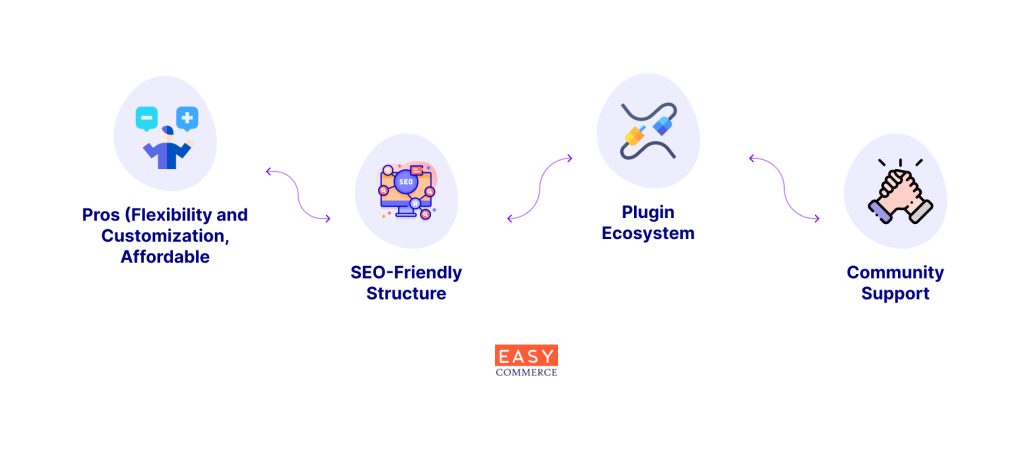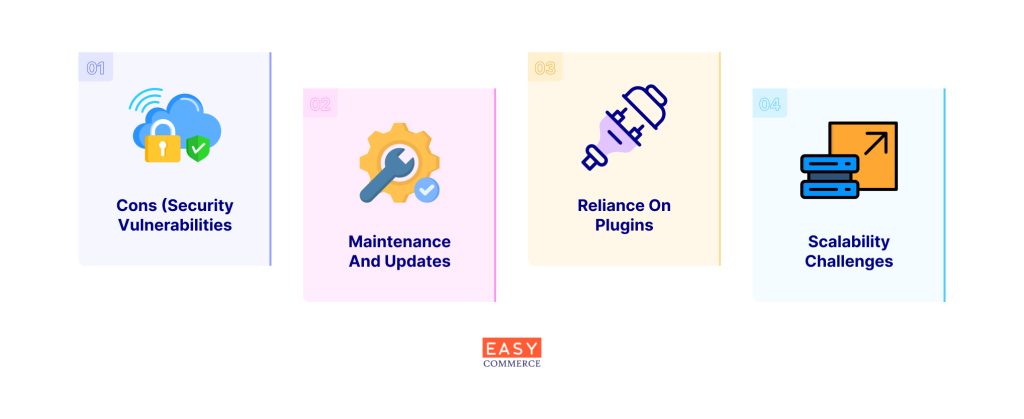Ecommerce owners often find themselves asking: “Is WordPress the best choice for my online store?” This question is common among growing businesses as they navigate the complexities of managing an ecommerce platform.
With new platforms continually emerging, choosing the right one has become essential for business success. WordPress provides extensive customization options for ecommerce to offer flexibility and a range of features. However, it also comes with its own set of challenges that businesses need to consider carefully.
From scalability issues to security concerns, many businesses struggle to decide whether WordPress is the right platform for their unique needs. In this blog, we’ll walk you through the pros and cons of using WordPress for ecommerce.
Let’s dive in!
Overview of WordPress as an Ecommerce Platform
WordPress, though initially popular for its blogging roots, has evolved into a leading choice for ecommerce, thanks to its extensive customization options and plugin ecosystem. Currently, it is powering over 43.1% of all the websites.
WordPress dominated the ecommerce market with its revolutionary WooCommerce plugin, which is powering over 6.6 million stores to this day.
WordPress provides a comprehensive toolkit for ecommerce owners, with a massive ecosystem and strong community support that’s hard to beat. In addition to WooCommerce, a variety of other ecommerce plugins make WordPress an all-in-one solution for building and managing an online store.
Some of the common reasons ecommerce owners prefer WordPress for ecommerce are –
- Customization Control: WordPress offers extensive customization options, as the majority of the tools allow you to fulfill all your customized brand needs.
- Ease of Use: WordPress is beloved by users for its intuitive interface and easy accessibility. Features like drag-and-drop builders simplify the overall design process, and plugins help you easily handle every other part of your website.
- Integration with Marketing Tools: Marketing is a huge part of ecommerce, and WordPress provides everything you need to get started! It offers seamless integration of tools for email marketing, social media, analytics, and SEO tools for ecommerce to help grow your store with ease.
In short, WordPress is loved by ecommerce businesses, due to its robust, flexible, and affordable tools. It fulfills common necessities for a business to grow and provides resources for long-term success.
Common Pros of WordPress for Ecommerce

Flexibility and Customization
WordPress allows you to create any sort of ecommerce website with the help of its vast plugin ecosystem, whether you are selling physical products, digital products, or memberships.
The most popular WordPress plugin is WooCommerce, which powers over 28.19% of all ecommerce websites. However, various emerging ecommerce plugins like EasyCommerce take customization and flexibility to another level!
WordPress’s flexibility makes it ideal for businesses of all sizes, allowing full customization without needing developers. Its extensive plugin marketplace offers unmatched options that no other ecommerce platform can rival.
Affordable and Control Over Costs
One of the major advantages of WordPress has to be its budget-friendliness. WordPress is free to use and offers free plugins to build a basic ecommerce store. Additionally, affordable paid add-ons give your business the flexibility it needs to stand out among competitors.
WordPress’s cost-effective approach makes it affordable for small to medium businesses looking to expand. Studies show that 56.6% of customers prefer to shop online, so affordable options like WordPress are great for reaching a broader audience.
With the stress of budgeting out of the way, store owners can focus more on customer satisfaction and marketing to improve credibility and authority.
SEO-Friendly Structure
WordPress is built with SEO in mind. Its SEO-friendly structure is strengthened by its huge plugin resources like Yoast SEO, which can help businesses like yours rank better in search results.
SEO is a significant factor in ecommerce businesses; WordPress being SEO-friendly is a non-negotiable advantage. According to an SEO expert, “SEO is the lifeline of online marketing. Without it, your website is lost in the vastness of cyberspace.”

You can also make mobile-responsive ecommerce websites using WordPress, as 70% of online purchases are made through mobile devices.
WordPress offers mobile responsive themes and plugins, which makes it perfect for building an ecommerce store.
Ownership and Control
Complete ownership and control over your ecommerce store are essential for growth. WordPress provides full control over your website, allowing brands to manage customer data and switch hosting providers without data loss.
Ownership gives businesses a sense of security, knowing they aren’t restricted by platform policies that could change unexpectedly. This is how WordPress ensures uninterrupted control and autonomy.
Plugin Ecosystem
With over 59,000 free and 5,200 paid plugins, WordPress provides endless integrations and customizations, from payment gateways to analytics and security. With access to most major payment gateways and shipping solutions, businesses can reach customers globally without any boundaries.
Beyond WooCommerce, plugins like EasyCommerce simplify your overall ecommerce website journey and ensures that you have the best experience. Plugins like Easy Digital Downloads simplify digital product sales, and WP Simple Pay simplifies payment processing, particularly for businesses selling services or individual products.
In short, the plugin ecosystem allows WordPress users to continually evolve the ecommerce experience. It offers extensive community support and frequent updates, keeping each tool secure and relevant.
Community Support
One of WordPress’s strengths for ecommerce is its multifaceted community support. As a popular CMS, WordPress benefits from a large global community of developers, users, and contributors who actively share resources, tutorials, and solutions on the official forum.
Users can find support through forums, dedicated blogs, YouTube channels, or extensive documentation. This community-driven ecosystem means that troubleshooting, plugin recommendations, and development tips are readily available, helping businesses like yours effectively manage and grow their online store.
Common Cons of WordPress for Ecommerce

Security Vulnerabilities
WordPress’s open-source nature and plugin dependence make it more susceptible to security issues, especially if updates are not regularly maintained. It’s reported that Wordfence, a popular security plugin, blocked over 13.7 million attacks on WordPress sites within 36 hours in 2022.
This means that ecommerce businesses must invest time and resources in putting security measures, like firewalls and regular updates in place to effectively protect sensitive customer data and payment information.
Maintenance and Updates
Running an ecommerce store on WordPress means paying constant attention to updates for the core software, themes, and plugins to avoid compatibility issues.
Lack of attention in these sectors would lead to unexpected errors, conflicts, or downtime, eventually disrupting the user experience. Regular maintenance can be challenging for smaller businesses without a dedicated technical support team.
Reliance on Plugins
WordPress relies on various plugins to add essential ecommerce functionalities. This plugin dependency can lead to compatibility problems and performance issues, particularly if the site uses too many plugins or poorly coded ones. Delay in action will result in lost customers and a lower conversion rate.
For example, WooCommerce’s data structure can slow down your website’s performance. As your business grows, this may lead to scalability issues.
Scalability Challenges
While WordPress and WooCommerce are excellent for small to medium-sized stores, scaling them to handle high-traffic ecommerce sites can introduce performance challenges.
As traffic grows, maintaining site speed and stability often requires more reliable hosting solutions, which can drive up both hosting and development costs.
To handle advanced features and support faster server resources, larger stores may need to invest more to ensure optimal performance and a smooth customer experience.
Alternatives to WordPress for Ecommerce
Now that you have a clear idea of WordPress’s pros and cons for ecommerce. If you still want to switch to another platform, here are some of our suggestions –
- Wix: Best for creating simple, visually attractive websites
- Squarespace: Best for designs and creative professionals.
- Shopify: Best for e-commerce business and scaling online stores.
- Webflow: Best for website building and designing.
- Weebly: Best for small businesses and first-time shop owners.
- Drupal: Best for developers.
- Contentful: Best for omnichannel marketers.
- Duda: Best for multilingual sites.
For more detailed information, check out our blog on WooCommerce alternatives here.
In a Nutshell
WordPress is a powerful and flexible platform that has become a go-to choice for many online businesses. Its ecosystem of plugins, coupled with strong community support, offers a customizable and SEO-friendly foundation for ecommerce.
With a wealth of tools designed specifically for online stores, WordPress empowers businesses to create stunning, high-performing websites that drive sales and customer engagement. If you are wondering how to simplify the ecommerce experience, WordPress provides various automation tools, intuitive interfaces, and seamless integrations to make managing your online store easier.
However, businesses should be aware of the technical upkeep, security requirements, and scalability considerations involved. Follow our blog to understand all the steps involved in growing an ecommerce business with WordPress.
Frequently Asked Questions (FAQs)
1. What primary technical skills are needed to manage a WordPress ecommerce site?
Basic WordPress knowledge is essential, but technical skills in plugin management, theme customization, and security updates are also necessary. Knowledge of HTML, CSS, and even PHP can be beneficial for advanced customization or troubleshooting.
2. What are the main security risks of using WordPress for ecommerce?
WordPress is vulnerable to security risks due to its open-source nature and reliance on third-party plugins, which can introduce potential exploits. Regular updates, security plugins like Wordfence, and secure hosting can mitigate these risks, but maintenance is crucial.
3. Can WordPress support multi-currency and multi-language features for international ecommerce?
Yes, WordPress can support multi-currency and multi-language setups through plugins like WooCommerce Multilingual and WPML. However, configuring these features requires additional plugins, which may increase site complexity and need consistent maintenance.

